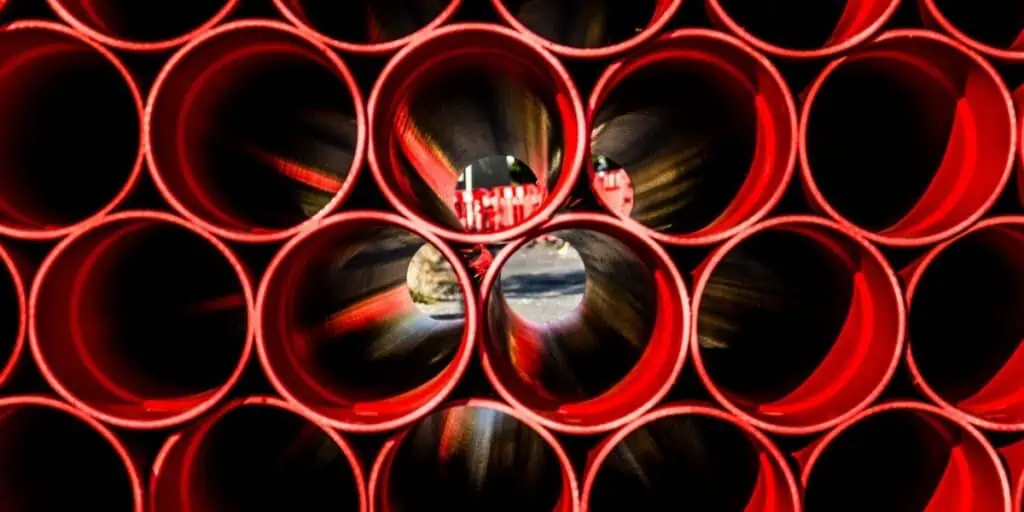Maybe you’ve seen it on the news. Maybe you’ve passed by a street where it happened. Hopefully you haven’t experienced it yourself, because water line problems – and the potential water line replacements needed to fix them – can be a major headache.
Unfortunately, for homes and businesses around Metro Vancouver, the region’s utility infrastructure is showing its age, those headaches seem to be happening more and more frequently.
With water lines (also referred to as water mains) failing in both busy thoroughfares and quiet residential neighbourhoods in many municipalities, it just seems like it’s a matter of time until every homeowner has to deal with the issue.
Here’s what you need to know so that you can spot the signs of a failed water line and be prepared to handle one – knock on wood – if you ever need to.
How long are water lines supposed to last?
The first question to ask is — is this going to be a problem for you? If your home is located in a newer area, probably not.
There are a host of factors that affect the lifespan of a water line – things like pipe material, water quality, and ground conditions – but the bottom line is that the kinds of buried utility lines that send water around Metro Vancouver are expected to last for 75 to 100 years.
What should you watch out for? Multiple water line failures in your neighbourhood.
A lone water line break might be caused by an installation mistake or localized conditions. If you see two or three near your home, though? That’s a stronger sign that you’re looking at age or wear-related failure, which is much more likely to impact multiple homes.
What can cause a water line to burst?
Water lines are built to be relatively durable, and being situated underground affords a bit of extra protection. Still, they can still be vulnerable to breakage and cracks after decades of service.
In general, the main things that can cause a water line to burst are:
- Freezing weather conditions or extreme weather
- Digging, yard work or construction
- Corrosion of the water line pipe
- Natural disasters such as earthquakes
- Deterioration from natural aging of the pipe material
Are all water line failures visible above ground?
Not always. Some water main breakages result in flooded streets or yards, definitely, but others can be more subtle, especially less severe pipe breaks.
If you notice consistent dampness around your property or bottom levels of your home that wasn’t there previously, that’s often a sign of a water line breakage.
Likewise, if you don’t see any changes but notice that water pressure around your home is suddenly weaker or very inconsistent, that’s another probable sign of water line issues. Paying attention to small details like that matters since Metro Vancouver’s naturally wet weather can make it difficult to spot moisture changes for long periods of the year.
Who’s responsible for a broken water line?
It all comes down to where the water line breakage occurred.
For context, water delivery systems work a bit like the branches of a tree. Larger water lines spread out into smaller ones until they eventually reach their final destination: homes and businesses.
If the water line under the street fails, that’s the municipality’s responsibility. However, if the water line running from the municipal line into your home fails, you bear the costs and responsibility of restoring it back to working condition.
That’s one big reason why regular pipe inspections are recommended. They give you advance notice about potential problems like water line failure, letting you take steps to fix outstanding issues while they’re smaller and more manageable.
How should someone respond to a burst water line?
If you notice the signs of a burst water main, there are a few things you should do.
Let’s consider the most common and visible sign: water bubbling up on the street or a portion of your lawn.
If that happens, you should call the city to report the issue. Here in Vancouver, the hotline number is 311. Even if the burst water line is on your property, only the city can shut off water delivery, so it’s important for them to be aware of the problem.
After that, it’s a good idea to call a plumber. They’ll be able to tell you whether the issue is related to your residential water line or the main municipal water line. From there, you’ll know whether you need to plan for more repairs or wait for the city to handle the situation.
A quick tip: no matter where the breakage has happened, it’s best to avoid drinking tap water or using the water in your home until the water main has been repaired or replaced, as there’s no way to be sure that other contaminants haven’t gotten into your water through the breakage.
How long does water line replacement take?
As with most buried pipes, it depends on how straightforward it is to access and repair or replace the existing water line.
In simple cases, the job can be completed in just a few hours. On the longer end, with more complex repair or installation requirements, it can take days to complete a job.
As plumbing contractors, we never like leaving homes or businesses without a water connection. If we anticipate that a water main replacement won’t be a simple same-day job, we let our customers know in advance so they can make alternate cooking and cleaning arrangements.
Will water line replacement or repairs require digging?
There are many cases where water lines can be replaced or repaired with practically no digging.
But – and this does need to be emphasized – trenchless fixes aren’t always possible or even the most cost-effective option.
For example, in more developed areas of the city, trenchless water line replacement in Vancouver can be a major challenge. Utility lines, like gas, electrical, or fiber optic connections are more densely packed together, which can make it especially difficult to complete a project without unearthing the physical water line.
That’s because, as the new pipe pushes through to replace the old one, fragments of the old pipe can break off and damage nearby utility lines.
Similarly, if a damaged water line is easily accessible by digging, it may actually cost less to remove the soil, fix the damage, and restore that portion of your yard when compared with the cost of lining and preparing a pipe for trenchless installation.
Be informed, have a plan, and know who to call
Water lines are built to last — but nothing lasts forever.
But even though you can’t stop water lines from failing under the street or on your property, you can take precautions. Remember:
- Be vigilant about persistent, unexplained dampness and moisture
- Have your water line inspected if you suspect there’s an issue
- Call the city immediately if you see water flowing up onto the road or your property
- Save the number of an emergency plumber for on-property repairs
Need an expert for a water line inspection or repair?
Our plumbing technicians have been helping residents throughout the Lower Mainland with their water lines for over 50 years.
We’re available for 24/7 emergency repairs, and we offer all of the latest trenchless inspection and pipe installation methods for cleaner, less disruptive service.
If you need service for your water line or another area of your home’s plumbing, you can contact us online or by phone at (604) 879-1415.

